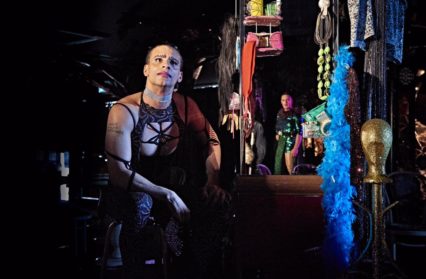Jafar Iqbal reviews Tuck by Alun Saunders and directed by Mared Swain at the Wales Millennium Centre, a look at the ins and outs of the world of drag.
After a hugely successful first season, Performances for the Curious is back at the Wales Millennium Centre. Neontopia have the honour of kicking off this new season, themselves returning after a hugely successful first production. A Good Clean Heart was an unmitigated triumph for writer Alun Saunders and director Mared Swain, so it was only natural that the pair teamed up again for Tuck. Set in the heart of Cardiff this immersive production follows four drag queens at different stages in their career, all trying to find acceptance from a world that doesn’t quite understand them. Tired of fighting everyone else they begin fighting one another, which brings its own unexpected consequences.
Tuck shares many similarities with its predecessor but comes from a more personal place. Having recently entered the world of drag himself, Saunders imbues his script with just enough inside lingo to feel realistic without alienating the uninitiated. His characters are believable too – Saunders has clearly made an effort to give each of them well-rounded and layered personalities. However, in focusing so much on character development, the story gets inadvertently sidelined. A major event in the story is life-changing for the characters, but it happens so late in the play that we aren’t given enough time to fully experience and digest that change. Instead, the play rushes to a finish and the ending feels flat.
It’s a shame that happens because the cast give worthy performances. Stifyn Parri is superb as Patrick, a veteran drag queen now in the twilight of his career. The comedy obviously comes naturally to Parri but, at least for newer audiences, the emotional depth of his performance is a revelation. Gareth Evans also stands out Eifion, the ‘tart with a heart’ of the group. Swain and Jess Williams’ direction of the four actors is solid, but she’s hamstrung by an inconvenient setting. While the Ffresh bar certainly provides the right ambience for such a production, its large restricting pillars don’t. At points important moments were missed by portions of the audience, forcing them to disengage momentarily. What never stops being engaging is the music, brilliantly composed by Dyfan Jones. The drag performances are a crucial counterpoint to the play’s darker themes, important for an audience that has come to celebrate.
Therein lies what is perhaps the biggest flaw in Saunders’ script – he’s trying to say too much. Primarily, Tuck is both a celebration and an indictment of the drag world, and is successful in expressing that, but the script also makes statements about race, politics, mental health and gender equality. Like the characters in it, the play doesn’t quite know what it wants to be, so it tries unsuccessfully to be lots of different things all at once.
With clearer focus, there are the blueprints of a very good play in Saunders’ script, but this current incarnation of Tuck isn’t quite there. Four strong performances can’t save the imbalance and while crowds may leave having cheered at drag queens, what they’ll miss from this production, ironically, is the heart.
Tuck is on at the Wales Millennium Centre in Cardiff until November 3rd.
You might also like…
Gareth Smith takes a look at RuPaul’s Drag Race UK Season Two, and the entrance of the hugely popular show’s first Welsh contestant.
Jafar Iqbal is a regular contributor to Wales Arts Review.












